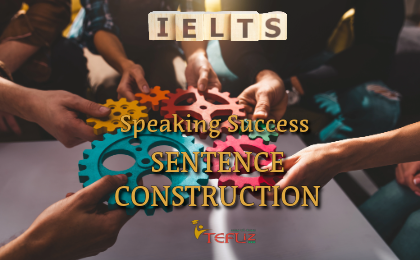IELTS and TOEFL Speaking Success – Sentence Construction
Mastering the skill of sentence construction in your IELTS Speaking test is not only crucial to success, but it also enhances your overall ability to express ideas clearly and fluently.
Here are some important tips to remember when you’re constructing your sentences for the IELTS Speaking Test –
- Understanding Sentence Structure: Every sentence in English typically follows a Subject-Verb-Object (SVO) pattern. For example, “She (subject) writes (verb) an essay (object).” Understanding this basic structure is your first step towards constructing grammatically correct sentences.
- Variety in Sentence Types:
- Simple Sentences: Contains a single independent clause. E.g., “The sun shines brightly.”
- Compound Sentences: Joins two independent clauses with a conjunction (and, but, or). E.g., “The sun shines brightly, and the birds sing.”
- Complex Sentences: Combines an independent clause with one or more dependent clauses. E.g., “Although it rained heavily, the sun shines brightly now.” Adding variety to your sentence types demonstrates linguistic flexibility, a key aspect IELTS examiners look for.
- Clarity and Conciseness: While complex sentences are impressive, clarity should always be your priority. Avoid overly long sentences that might confuse the listener. Strive for a balance between simple and complex structures to keep your speech clear and engaging.
- Using Connectives: Connectives like ‘however’, ‘furthermore’, and ‘therefore’ are your allies in creating coherent speech. They help you transition smoothly between ideas, adding a layer of sophistication to your language.
- Active vs Passive Voice: The active voice often makes sentences clearer and more direct (e.g., “The chef cooked a delicious meal”). However, the passive voice can be useful, especially if the focus is not on the ‘doer’ of the action (e.g., “A delicious meal was cooked”). Use both forms in context with the topic.
- Practice Makes Perfect: Regular practice is key. Try constructing sentences with new vocabulary and varying structures. Peer reviews or speaking with a language partner can offer valuable feedback.
Making Grammatically Correct Sentences
Efficient sentence construction is a skill honed over time. You can significantly improve your English proficiency by understanding the basics, experimenting with different types, and practising regularly. Remember, every great journey begins with a single step, and your journey to IELTS speaking success starts with mastering the art of sentence construction. Keep practising, and you’ll surely excel!

